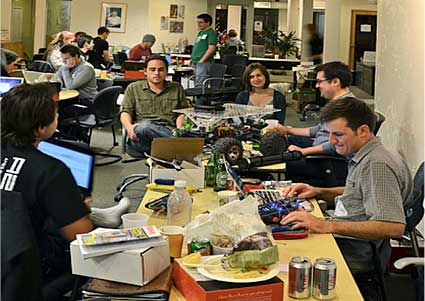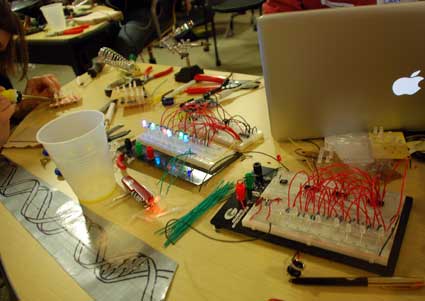Future Now
The IFTF Blog
Science Hack Day Goes Global

- Images courtesy of Ariel Waldman
Today IFTF research affiliate, founder of spacehack.org, and open science strategist, Ariel Waldman, will make the official announcement that Science Hack Day is going global at her morning keynote at OSCON—the O’Reilly Open Source Convention in Portland.
The initiative, made possible by a grant from the Alfred P. Sloan Foundation to IFTF, will support Ariel’s work at encouraging the creation of Science Hack Days in cities around the world. Ten people will be selected to win a scholarship for a trip to Science Hack Day San Francisco 2011 where they'll experience first-hand how Science Hack Day works and connect with a global community of organizers. This Science Hack Day Ambassador Program will award individuals who are motivated and planning to organize a Science Hack Day in their city. Open source instructions for how to create a Science Hack Day in your city and how to apply to the Science Hack Day Ambassador Program are available at sciencehackday.com.

Science Hack Day is a 48 hour all-night event that brings together designers, developers, scientists and people with good ideas in the same physical space for a brief but intense period of collaboration, hacking, and building 'cool stuff.' A hack is a quick solution to a problem—maybe not the most elegant solution, but often the cleverest. On the web, mashups are a common example of hacking: mixing up data from different sources in new and interesting ways. Science Hack Day aims to bridge the gap between the science, technology and design industries to encourage future collaboration, community building and general social awareness of one another. The mission of Science Hack Day is to get excited and make things with science. "Science should be disruptively accessible," said Waldman. "Science Hack Day empowers people from a variety of different backgrounds to explore, participate in, and build new ways of interacting with and contributing to science."
Ariel’s work builds on a rich research tradition on open science at IFTF—from our 2006 Delta Scan project for the UK Government’s Offices of Science and Innovation to engage the global scientific community in identifying key innovations and disruptions in science—to the first IFTF science hack day with Ariel in November of 2010. As Anthony Townsend wrote on Future Now in 2008, “openness is rocking the scientific world,” and Ariel will be bringing this new open world of science to a city near you.



